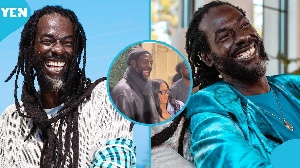- Home - News
- Elections 2024
- News Archive
- Crime & Punishment
- Politics
- Regional
- Editorial
- Health
- Ghanaians Abroad
- Tabloid
- Africa
- Religion
- Photo Archives
- Press Release
Health News of Monday, 2 June 2025
Source: www.ghanawebbers.com
Bleached Babies: The toxic beauty obsession endangering Ghana’s children
A joint investigation by JoyNews and Nigeria Health Watch reveals a troubling health crisis. Parents in Ghana are bleaching the skin of their babies and young children. They use toxic, banned substances for this practice.
In areas like Chorkor, a fishing community in Accra, lighter skin is seen as a status symbol. Mothers apply creams with harmful ingredients such as hydroquinone and mometasone. These ingredients are banned by Ghana’s Food and Drugs Authority (FDA). Some even use household bleach, known as hypochlorite.
Caro, a fishmonger and mother of two, believes beauty means lighter skin. She started bleaching her children when they were just three years old. “They were born dark. I didn’t like that,” she said. “Now their skin is lighter. That’s beauty.”
Caro uses Skin Light cream, popular despite its harmful ingredients. She acknowledges the risks: “Yes, it can cause kidney failure or skin cancer.” However, she feels social pressure outweighs these dangers.
Naa Ashorkor, another mother from Chorkor, shares similar views. She says many parents prioritize keeping their children's skin fair. “Some use bleach found in detergents,” she admitted. For them, light skin signifies beauty and opportunity.
Emmanuel Nkrumah from the FDA warns against using hypochlorite on human skin. He states it is extremely dangerous and toxic for children.
The trend extends beyond creams; some women inject bleaching agents into their bloodstream at unregulated clinics. These risky procedures can cost up to GH¢1,500 per session.
Dr. Titus Beyuo confirms an increase in mothers bleaching newborns to avoid paternity suspicion. He notes that this issue is more common than people realize.
In 2018, the FDA warned about pregnant women using cosmetic pills to lighten unborn babies' skin. Now intravenous bleaching poses even greater risks to health.
Dr. Nsiah Asare emphasizes that parents should not bleach their children’s skin. He insists there are laws protecting children from harmful practices.
While studies on child skin bleaching in Ghana are limited, the World Health Organization reports over a third of Ghanaians tone their skin. The numbers are higher in other African countries: 77% in Nigeria and 25% in Mali.
In Chorkor, this trend remains strong despite concerns from residents like Quaynor Allotey about his sisters’ actions. Societal ideals continue to drive this practice.
Behind every bottle of bleaching cream lies a painful truth: children learn their natural skin isn’t enough. This damage affects them physically and psychologically across generations.
However, this cycle can be broken.
Ghana's true beauty lies not in skin shade but in its people's resilience and heritage richness. We must protect our children from harmful practices like these.
This documentary should serve as a call to action—for education and cultural change regarding self-worth over appearance.
No child should feel pressured to change their skin for love or acceptance. Let self-worth shine brighter than any cream ever could.
This investigation was supported by Nigeria Health Watch.











